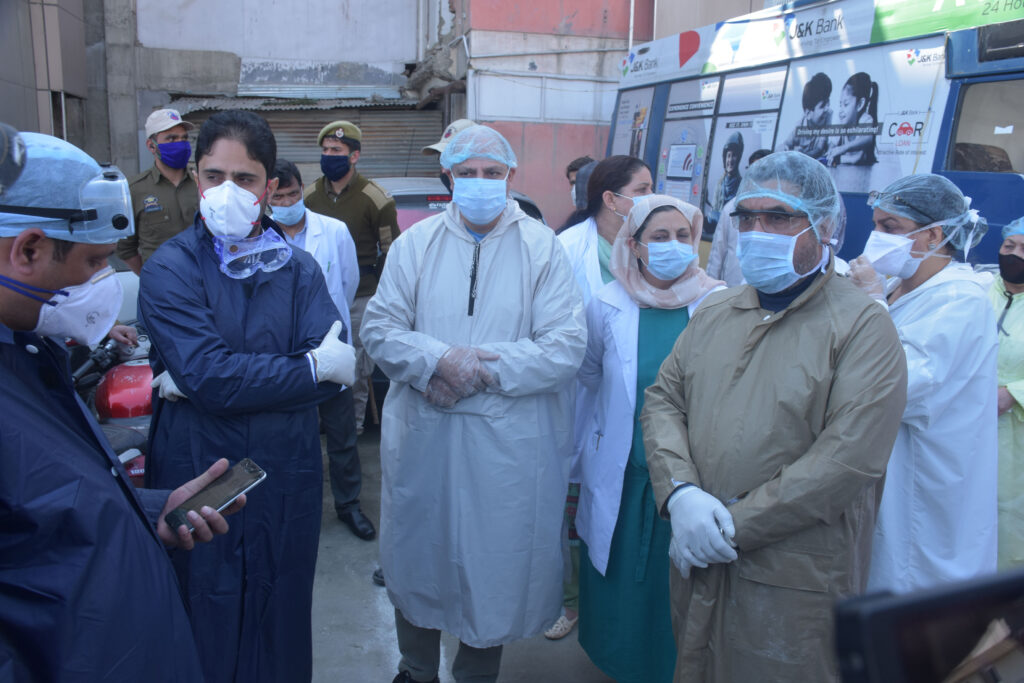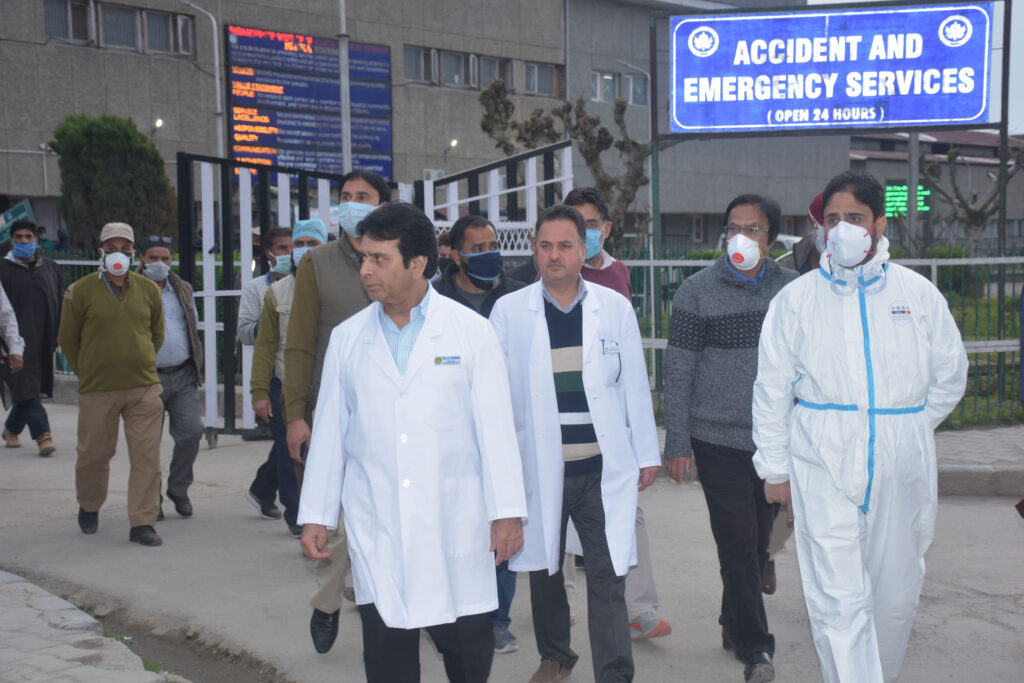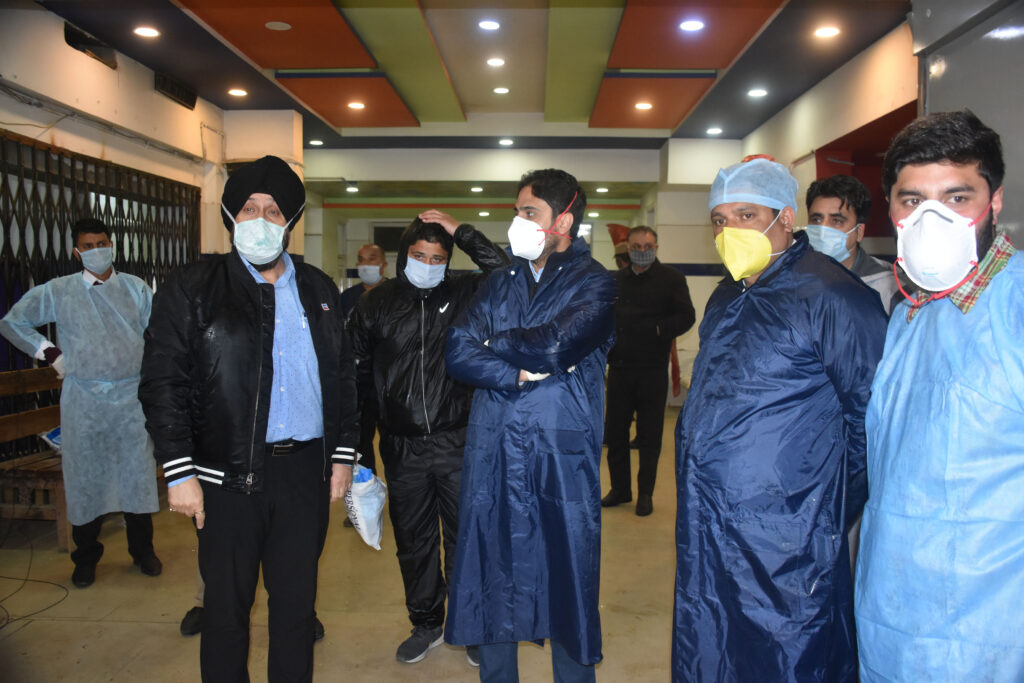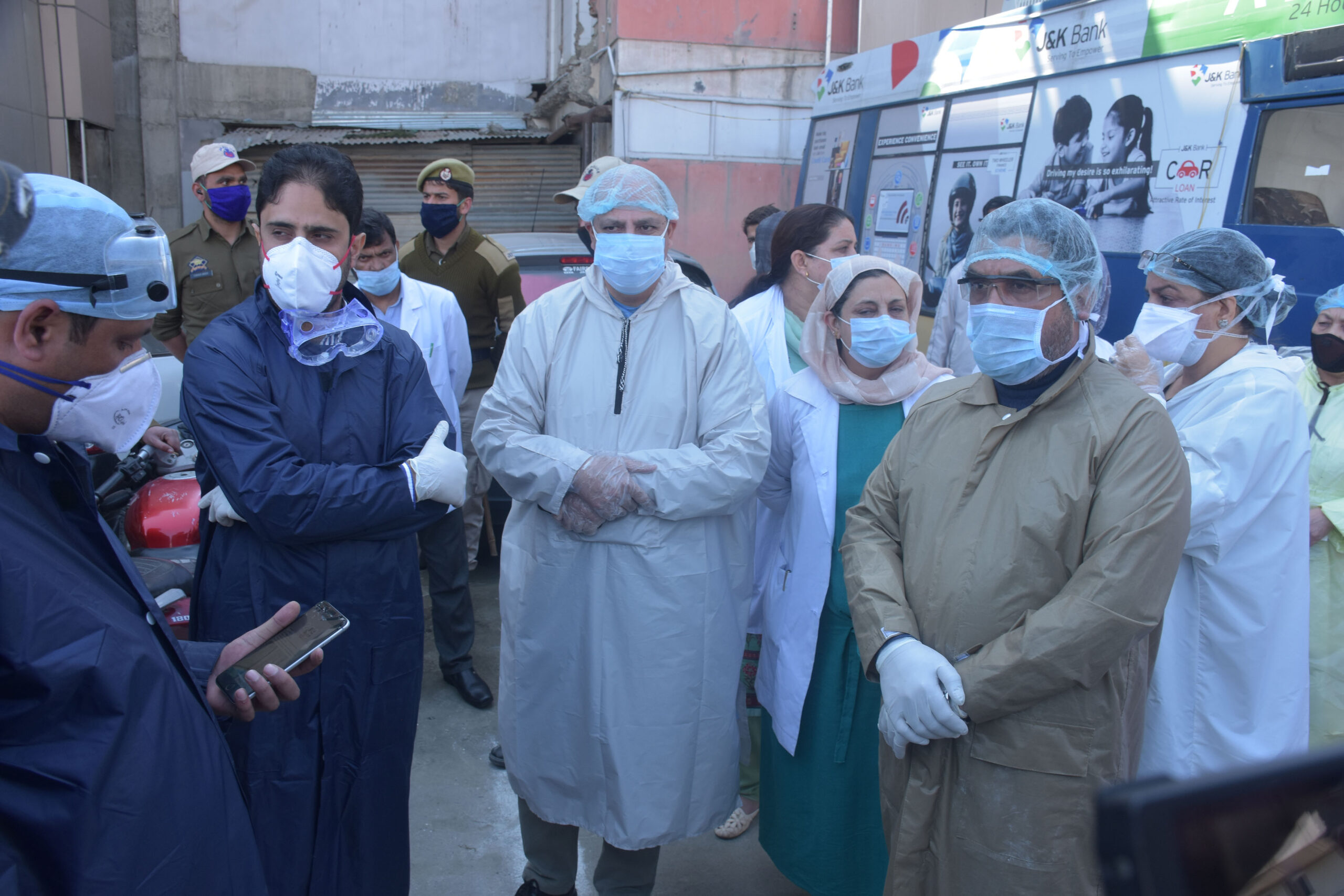‘Need to be on the front foot till we win COVID-19 battle’SMC’s stature and efficacy as an institution is on the rise: Mayor
Mayor of Srinagar, Junaid Azim Mattu delves on how SMC workers emerged as the frontline soldiers in the war against coronavirus. In a free-wheeling interview with Kashmir Scan‘s Ajaz Rashid, he talks about the SMC’s new role, his struggles in the fight against COVID-19, and much more. Excerpts

What are the various fronts SMC is working on to deal with COVID-19?
The SMC started its initiative to prevent the community spread of COVID-19 in Srinagar before any other city in the country. We started by understanding, acknowledging, and perceiving the gravity of the challenge we could possibly face in Srinagar. I conveyed a special meeting of the SMC General Council where the elected body deliberated on the issue and agreed with my proposition to take some drastic, immediate steps to ensure Srinagar isn’t vulnerable.
We started by shutting down open-air markets and flea markets including the heavily thronged Sunday market. We unanimously passed a resolution mandating all schools within Srinagar city limits to shut down immediately. We also sought the closure of restaurants, gymnasiums, and other non-essential stores and commercial entities.
This is where we started. The general lockdown initiated across the country came much later and by that time it was relatively easy for Srinagar to transition into the complete lockdown because of how early we had started with the initial phases of lockdown on our initiative.
We then started to research and speak to experts what we would need and how we should prepare. We conducted in-depth research about what cities in China and other countries were doing. What chemicals were they using for sanitisation and decontamination? What machines were they using? What was the efficacy of their initiatives and how did they combat COVID-19.
So we planned a comprehensive, scientific response. We made various decontamination protocols like how would we decontaminate a 300-meter radius around the location of a positive case? How would we decontaminate hospitals and high-risk areas? How would we ensure decontamination and sanitisation mechanisms are put in place outside hospitals and other public offices that would need to function in the lockdown? We then started procuring the equipment and the chemicals that were found effective and recommended in sanitisation procedures against COVID-19. Elaborate city-wide sanitisation and decontamination drives were initiated and we are continuing to be aggressive with these initiatives to ensure we don’t go into a Stage-3 Community Transmission situation. We have sanitised and decontaminated containment zones, quarantine centres, hospitals, lanes, by-lanes, roads, and nearly 3 lakh vulnerable hotspots in the city. As soon as the district administration communicates a new positive case in Srinagar and verifies the location of the case, we initiate a 300-meter radius decontamination of the area. We are also ensuring the lockdown is enforced in letter and spirit and working in close coordination with the district administration, which I must add is doing a remarkable job.

During this dreaded pandemic, SMC is at the forefront. What are the challenges you are facing?
It is an unprecedented situation without any doubt. We never imagined how a global pandemic would look like and how we would face such a situation. SMC has taken the initiative to be at the forefront of the battle in Srinagar – both as a nature of its core responsibilities and also as the elected local self-government for the city. We have endeavoured to evolve as a local government, not just a government department and that has meant going above and beyond jurisdictions, calls of duty and established traditional protocols. This has been a huge success which is evidenced by how SMC is today identified as a local self-governing institution that took the leap in Srinagar and took the onus on itself in ways more than one.
Our ground teams are working in extreme conditions and circumstances and we have tried our best to protect and equip them adequately. I wish we could do more for them and we are trying to improvise every single day. This has been a challenge and continues to be a challenge. There is a severe dearth of protective gear and equipment not just within India but globally. That said, we are ensuring they are protected and safeguarded to the best of our abilities.
The other challenge we faced initially was logistics – how to transport our equipment and chemicals from different cities in the country to Srinagar. There the Army and the Indian Air Force went out of its way to help us. In the initial days I remember being up in the middle of the night on phone with senior IAF and Indian Army officers coordinating air-cargo lifts from Surat, Mumbai, and Delhi. As a result of these efforts and their help, we were able to start our initiative before most other cities did and the results are visible and encouraging.
There is also an element of discomfort in some traditional quarters both within the system and outside the system on how SMC is emerging as a leader and is being emulated and followed by other Municipal Corporations across the country. Some of the most prestigious Municipal Corporations in the country have approached us to share our expertise and best-practices in fighting COVID-19. The Prime Minister, in a list of less than 20 cities in the country, has asked Srinagar (at number 6) to share its best-practices and expertise in dealing with COVID-19.

How has this crisis been on the personal front? How have you coped?
It has been exhausting – physically and mentally. For the initial 24 days, I self-isolated and shifted to the State Guest House to ensure my level of exposure to the situation doesn’t risk the safety of my family. After 24 days – on being tested negative for COVID-19, I returned home and this was more than three weeks that I was seeing my family. That was the toughest part.
It has also been a learning experience. We have evolved as an institution and I guess it takes adversities for such evolutions.
If we see this through successfully, I am going to take some time off and reflect on a lot of things – perhaps recuperate a bit too.
What has been heartening is the overwhelming public support we have been blessed with. What has been absolutely disheartening for all of us is how a handful of individuals have left no stone unturned to discredit our work while sitting in their homes and taking directions from various quarters to sabotage the exemplary work being done in Srinagar.
While Srinagar has evolved as a leader in the country in its COVID-19 response, some people within our society are not happy with this and hence the lies, propaganda, baseless allegations and defamation. I initially took it in a stride and decided to ignore it. However, when it became evident that this misinformation campaign was evolving into an impediment to our work – the SMC by consensus decided to take a stern, strong legal recourse. I am going to ensure everyone who has discredited, defamed and tried to spread lies about SMC during this pandemic is made answerable in the court of law.
You have introduced sanitisation tunnels, new spray machines etc. How effective are these things?
The SMC Decontamination and Sanitisation Tunnel have been a huge success and time will prove how beneficial they were. I remember researching around midnight during the first week of our response and coming across similar tunnels and disinfection chambers being used in China and Turkey. I woke our Mechanical Engineering Executive Engineer up and sent him the details, drawings and visuals and asked him if we could make these? He asked me for two days to make our first prototype. On the third day our first prototype was ready. It had cost less than Rs 30,000 and all required specifications in terms of the micron size of the spray mist were met. We then went ahead and improved the tunnels and switched from fuel operated tunnels to electric motor operated tunnels. Within a matter of 10 days we covered all major hospitals in Srinagar. We then covered certain essential public institutions like the High Court. We have 17 tunnels operational in Srinagar and more are on their way. We have created a dedicated team to ensure they run without interruptions and smoothly.
The chemicals we use in these tunnels is absolutely safe for human contact, so safe that its also used in cosmetics, topical ointments, disinfectants, and shampoos! It’s a 5th generation chemical with very high efficacy and is widely used to sanitise operation theatres for instance. We have all medical and scientific approvals for the tunnels. Somewhere down the line, an elaborate misinformation campaign was launched by certain mischief mongers to discredit these tunnels by comparing them to tunnels elsewhere which were using alcohol-based and corrosive chemicals such as sodium hypochlorite. This campaign continues and is extremely unfortunate in how it aims to impede our efforts to curb the spread of a fatal viral pandemic. We have put out the information in the public domain, shared information and also take strict legal recourse including legal suits and police complaints against these mischief mongers and expect a deterrent to be set.
Our tunnels are now being emulated and understood elsewhere. A central government scientific agency has recently inaugurated a QAC-based tunnel in Delhi and I assure you these tunnels in Srinagar will eventually prove that they made a huge difference.
As for our machines, we are using mobile sterilisation units, boom-sprayers, anti-smog guns, dual chemical foggers (with hydrogen peroxide and silver nitrate) as well as mechanised knapsack spraying machines around the city. We have also improvised a fleet of our existing machines including machines from our drainage wing and sanitation wing for sanitisation protocols. They have all been tremendously successful and have made an enormous difference.
As for the chemicals, we are using QAC exclusively for our tunnels and hospital interiors, sodium hypochlorite for city-wide general decontamination and sanitisation and hydrogen peroxide and silver nitrate for chemical fogging (different from thermal fogging, which is futile against COVID-19 and is being done in a lot of other cities). Different chemicals for different protocols. All based on evidence, research and recommendations by the most reputed scientific and medical authorities and agencies.
Doctors and other paramedic staff are getting incentives during this situation. Don’t you think that the SMC workers should also be given incentives?
I salute our doctors and paramedics for being on the front lines of this battle even when they don’t have perfect protection and deserve much better. We are all in their debt.
We are also indebted to our sanitation workers and members of ground teams. We owe them a lot. We have initiated a medical insurance program for them to the tune of Rs 50 lakh cover per worker in view and scope of our COVID-19 initiatives. We are also considering other wage incentives and will continue to improve the quality of their lives. They deserve this and more and I am personally committed to this goal.
Are you optimistic to break the chain of COVID-19?
Insha Allah. Yes, I am. I believe we have succeeded till now to prevent a community transmission in Srinagar despite the fact that we had our fair share of positive cases as a percentage of our population. I believe we need to continue these efforts and also extend the lockdown – perhaps in various phases for a while more. Contact tracing and testing by the District Disaster Management Authority and the Health Department have been exemplary given their challenges.
This coming month will be decisive and that is why I keep underlining the need to not be complacent. We cannot afford a false sense of victory or complacency. We need to be on the front foot and that is what we are going to do till we win this battle.
Does your department face any hurdles from the government administration?
The Srinagar Municipal Corporation – as the local self-government of Srinagar – had remained dormant for years. This meant that its evolution as self-government never happened and the local administration perceived – and understandably so perhaps – the SMC worked just as another government department.
The vision and legal mandate of SMC as Srinagar’s elected government will take time to percolate and be embraced. Till then there will be challenges, jurisdictional issues and friction – some sort of resistance within the system. It will take time and there will be harmony. I see it happening and SMC’s stature and efficacy as an institution is on the rise. This is being acknowledged and lauded widely.
People would appreciate if SMC ropes in Consumer Affairs department to check vegetable and milk outlets for cleanliness and other hygiene-related issues.
We are working on this. Years ago the food inspection and regulatory role was with SMC and we had our food inspectors. We still have the mandate as per the law but need to re-evolve an institutional regulatory system to ensure the curtailment of adulteration, checking overpricing, black-marketeering and other hygiene regulations. We are writing to the Government about this.
In the meanwhile, the Chief Health Officer SMC has been asked to constitute and lead market checking teams to ensure all those food and grocery outlets that have been permitted to function are adhering to hygiene standards and physical distancing norms.
Some people believe that while dealing with the COVID-19 issues, the normal general cleanliness of city has been effected. Even the garbage is collected after a gap of two to three days.
I am sure the usual sanitation protocols have been impacted in some areas. The overall sanitation scenario in Srinagar is still very good. We have jumped from 357th rank to 45th rank in the country and are now considered to be one of the 50 cleanest cities in the country. A few years ago we were considered to be one of the dirtiest 50 cities. So there has been an enormous and marked difference on the ground.
We are trying to ensure the normal sanitation does not suffer and are committed to that. There is an acute dearth in manpower in SMC and we have 60 per cent of the sanitation workers that we need as per population and geographical standards of the Swachh Bharat Mission guidelines. The same sanitation workers who collect trash in the morning from our homes and localities then go on for sanitisation drives. We have created rosters to ensure both areas carry on with simultaneous efficiency and we will improve.
I also appeal to the people to step up and help. Maintain local sanitation standards and reduce your garbage output as much as possible to help us till we emerge victorious in this battle.
There is a need to go for sanitisation of the whole city in addition to the affected areas. Has SMC any plans to do it?
We have been doing it for more than a month and a half now if not two months. On average, nearly one thousand vulnerable hotspots are sanitised by local teams at the ward-level every single day.
As for a city-wide intensive, mechanised sanitisation drive, it has already started and is on-going. An elaborate roster for all 74 wards of the city has been initiated. Four to five wards are being thoroughly sanitised every single day by nearly 20 mechanised teams with full mobilisation of our fleet. Every area of the city will be sanitised. That’s a promise. We are doing it as per an elaborate plan where hotspots and high-risk areas get the first priority but we will ensure no area is left vulnerable. I request the people to continue investing their faith in us – we are doing things scientifically and systematically.
Any message for general public?
I want to thank everyone for the overwhelming love and affection that the people have bestowed on us in the last month. We feel truly blessed and encouraged and this motivates us to work even harder. I request everyone to continue doing their bit and adhering to all guidelines and advisories issued by the administration. We need to see this challenge through collectively and we all have a role to play. The most important role is that of the people.

Leave a Reply